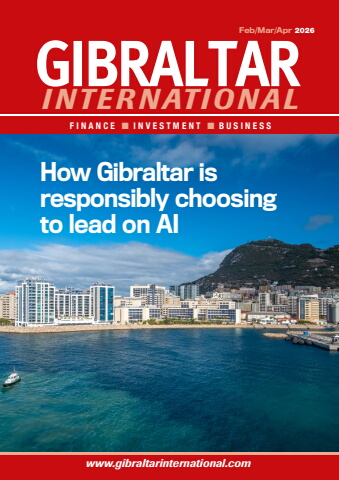By Joey Garcia, a Financial Services Partner at ISOLAS and Chairman of the Gibraltar Funds & Investments Association (GFIA)
A strong Gibraltar delegation returned from a short but intense mission to both Singapore and Hong Kong in July. The exercise was one of profiling Gibraltar financial services generally, but then also dealing with the specifics of the European regulatory framework which may affect both Singapore and Hong Kong based investment managers, and the options and solutions available to them through Gibraltar.
At a series of very well attended Gibraltar Government hosted technical sessions, the panel, who were made up of Gibraltar Funds and Investments Association (GFIA) representatives, as well as the Financial Services Commission, set the scene by setting out a series of very interesting EU statistics. The first speaker Adrian Hogg highlighted that although the population of the EU represents only 7% of the global population, it still represents 23.8% of global wealth. To put these statistics in perspective, it was also highlighted that China represents 19% of the global population but only 12.2% of Global wealth.
In addition to the above, it was also highlighted that the EU investor base in Hong Kong hedge funds account for approximately 18% of Assets Under Management (AUM), and 21% of Singapore AUM. In short, the message from the Gibraltar delegation was that the EU is a relevant market, and access to Europe a relevant matter to consider moving forward.
In my own part of the opening presentation, I highlighted that the position within Europe today is that the only way to distribute your fund are either through national private placement regimes, or through the pass-porting option granted by the Alternative Investment Fund Managers Directive (AIFMD). In previous trips to Asia we have often heard managers speaking about reliance on the concept of ‘reverse solicitation’ as a marketing strategy. The dangers of relying on this nebulous concept as a ‘strategy’ were highlighted in some depth, with the underlying principle being that it would not be possible to ‘solicit a solicitation’ and the importance of the jurisdiction-to-jurisdiction interpretation and guidance on what might constitute direct or indirect marketing in each. It is certainly the case of most practitioners that if managers based outside of the EU are not prepared to comply with the obligations of AIFMD, they are better advised to avoid Europe altogether than to rely on the no-mans land of reverse solicitation.
EU market through Gibraltar
After dealing with what would not work as a strategy for a manager based in Asia, we were also then able to deal with strategies that would actually allow access to the EU market, through Gibraltar.
In a pure AIFMD compliant context, a big focus of the first presentation was to highlight what I describe as the ‘build’ or ‘buy’ options for managers. The build option being that of a standalone establishment of a Gibraltar based AIFM, and the buy option being that of using a platform, or management company solution which would take the appointment as the manager’s appointed AIFM, but delegate the portfolio management function (potentially along with other non-core functions) back to Singapore or Hong Kong respectively. Under both build or buy options, the ability exists for Asia based managers to maintain their licensed and operating presence within their home countries, and have the Gibraltar AIFM delegate the core portfolio management service to them there, thereby obtaining the European footprint. In this context, the requirement for the delegation being on an objective basis, and the avoidance of any of the letter box provisions of AIFM were also discussed.
When we consider that it is envisaged that national private placement regimes are scheduled to come to an end in 2018, and that reverse solicitation is not a marketing strategy, we do envisage growth in the AIFM platform space and we are starting to see this growth across various fund jurisdictions in the EU, following very much the existing UCITS platform models that have existed historically. The Gibraltar proposition lies in being able to offer European access, in the same way as a solution from London, Luxembourg, Frankfurt or Paris, and this is a strong message in Hong Kong and Singapore where historical use of the British Virgin Islands and Cayman structure may start to change as the weight of compliance and transparency increases.
The Gibraltar Stock Exchange (GSX), listing proposition was also placed before the audience gathered at both events with the core message being one of a Gibraltar listing’s visibility, and the global drive to disclosure and transparency. As well as dealing with the Listing process, GSX generated real interest on their proposed securitization offering planned for later this year. Here, the proposed creation of exchange traded instruments (ETI’s) would allow the securitization of alternative investments into ETI’s, which are completely free of issuer credit risk and linked directly to and backed by the underlying asset.
The ETI is intended to combine the advantage of a fund (the collateral from assets) within the flexibility in the design of a certificate (a derivative security issued by a bank). The ETI is a straight pass through instrument that delivers direct (delta one) performance of the underlying asset (in this case a fund). The critical point is that ETI’s although linked to the underlying performance of the fund, are not collective investment schemes. The ETI’s issued on a stock exchange can then be purchased by suitable investors through their broker relationship. They are not Alternative Investment Funds under AIFMD, but they are UCITS eligible assets and issued with an approved prospectus (and as such, suitable for public offering within the EU). Given that an ETI has no restriction on asset class, and that non-EU funds can also be securitized for listing on an EU exchange, there was a great deal of interest in this offering which GSX continues to develop with a group of experienced parties operating in this space.





